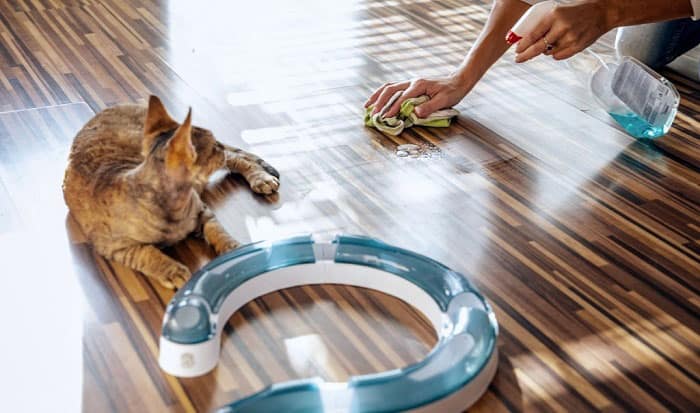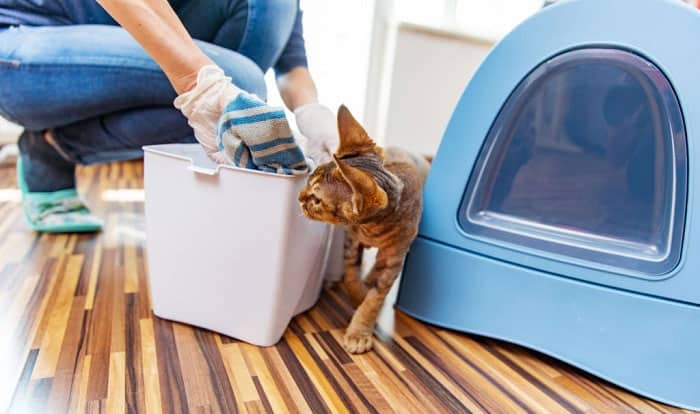Male cats are the most common culprits when it comes to cat spraying. Female cats can start spraying at any moment under some circumstances, although this is uncommon.
If your cat has suddenly started spraying in your house, it’s crucial to figure out why and how to stop it. It will only worsen you and your pet if you do nothing and attempt to ignore it.
Here’s how to figure out how to stop a cat from spraying indoors and why your cat is spraying.
Table of Contents
How to Stop Cats Urinating in Your House
1. Clean up the sprayed-on area
Check to see whether your cat has a specific spraying location, and if so, keep your cat away from it.
It would help if you cleaned the area where the cat sprayed. If your cat scented or saw the last track, he may urinate at the place again.
You can rearrange furniture or lay an item or mat on the floor near the cat spray area. After a time, allow the cat to revisit that location.
2. Keep an eye out for litter box issues
Whether or not your cat will continue using the litter box depends on how well you handle the litter tray. It also helps in part to stop cats from spraying.
You should pay attention to your cat’s routines and preferences. They could prefer a litter box that isn’t soiled, like sprinkling litter or a filled litter box. They might not enjoy mud that clumps and adheres to their feet’ soles.
Also, think about the sort of litter tray you’ll be using:
- If your cat has arthritis, it may be difficult for them to climb into the high litter tray. Then a larger, shallower tray would be ideal.
- Other cats like complete solitude while going to the bathroom, so a covered litter box can be a good option.
Also, think about where you’re going to put your litter box. Cats prefer a quiet, contained environment to one that is excessively raucous. It’s generally a good idea to sit in the corner of a quiet room.
Your cat’s litter tray should be cleaned regularly as well. Some cats are quite picky, and they will only use the litter tray once.
Also, make sure there are adequate litter boxes for the cats in the house. If another cat is already in it, cats are unlikely to utilize it.
As a general rule, it would help if you also had more litter boxes than cats in the house. Also, keep in mind that they all need to be in distinct places!
3. Reduce the amount of stress your cat is under
Stress is a major issue with cats, and it’s one that many cat owners are concerned about. Your cat’s spraying in your house might be the result of stress. They will most likely poop and scratch on household furnishings in addition to spraying.
Spraying all over the place is a sure indicator that a cat is agitated. This might be due to changes in their environment. It can be the result of a transfer to a new house, the arrival of a new cat, or the departure of another cat, among other things.
You should spend some time playing with your kitten and creating a fun space at home to keep a cat from spraying.
Also, double-check that you have enough food bowls and litter trays for the number of cats in your house. Also, keep an eye out for other cats that could come into your home and devour their food. The cat will be agitated and in a poor mood for you if this is not carefully arranged.
4. Take your pet to get neutered
Our neutered cats are less prone to spraying. They will be less motivated to retain or defend a territory. They are also less stressed in general. If your cat is spraying and you’re considering neutering them, it’s a good idea to get a cat to stop spraying.
5. Reduce your desire to communicate
Spraying is a common way for cats to communicate. As a result, limiting your cat’s contact with other cats will assist in stopping cat spraying. It’s possible that your cat was sprayed as a result of seeing or sensing cats outside.
If your cat is sitting closer to the window to observe the outdoors, you should relocate something to put on the window to stop it.
If possible, you should close all of the doors and curtains. Keep the outside of your house clean and prevent leaving food out for other cats to be attracted to.
6. Make use of calming products
Use scented sprays, pheromone diffusers, collars, or edible supplements to help your cat cope with stress. These products are formulated to help cats relax, reduce nervousness and make a cat stop spraying uncontrollably.
7. Be patient
You should not scold or chastise your cat if it sprays. When cleaning cat urine or eliminating spray scents, you shouldn’t be angry. This will add to your and your pet’s stress levels, causing them to spray even more.
Please keep track of where your cat sprays and clean the area with a natural laundry detergent, then encourage them to play, sleep, or even eat there instead. Thus, encourage your cat to connect that place with fun or relaxation rather than worry. And when combined with ways to prevent a cat from spraying will be highly effective.
8. Visit the veterinarian
If you’ve done everything and still can’t persuade your cat to quit spraying, contact the veterinarian. Veterinarians will examine the cat objectively and do tests to identify what is causing the unexpected spraying activity.
Alternatively, you may seek the advice of a feline behaviorist, who can provide valuable advice on how to curb undesired habits such as spraying. Improving your pet’s difficulties is advantageous to you.
What Causes Your Cat Spraying Indoors
Spraying in cats can occur for a variety of causes. And it might be due to medical or behavioral problems. Identifying the source of the spraying is the first step in finding out cat spray solution and restoring normalcy to your beloved kitty.
1. Mark the territory.
Spraying is an activity to indicate territory. Cats leave traces of their urine scent in their environment to alert other cats that they are around. It aids in the control of their area and the avoidance of disputes with other cats.
2. Cystitis and other infections of the urinary tract.
These infections may make cats more frequent spraying. Besides, the illness leads the cat to urinate quickly rather than attempting to go outside or to the litter box.
3. Your cat is old.
An older cat may not want to move around. Some cats’ memory might deteriorate as they become older. Besides, this implies that kids may forget some of the habits they’ve learned, such as where to go to the potty.
4. Your cat was feeling scared.
Because of the changing environment, or perhaps there is a threat outside. Your cat, for example, may be terrified of a neighbor, a neighbor’s cat, or a new cat you’ve recently acquired.
5. Problem with the litter box.
There might be an obvious cause if your cat doesn’t use the litter box recently.
- A filthy litter box: If the tray is excessively unclean, cats will not utilize it.
- A spotless litter tray: Using scented litter, deodorant, or a disinfectant with a strong odor might put your sensitive cat off using the tray.
- Wrong trash type: Changing the litter’s aroma may deter your cat from using it.
- The total number of trays: Cats will spray out if the number of trays does not match the number of cats you have at home.
- Its location: If the tray is outside, where it may be disturbed by your dog, children, or other cats, your cat may feel too insecure to use it and seek a more secure area.
- Litter tray type: If you currently have an open tray, consider purchasing one with a lid to provide your cat with more security.
Is It True That Only Male Cats Spray?
It operates the same way tom cats leave their mark to attract females. When a female is in heat, she may spray urine to signal to nearby males that she is ready for sex! Hence, neutering your cat is crucial. When it comes to unwanted rehoming kittens, rescue centers are sometimes overburdened.
Males most commonly use spraying to mark territory, while females use it to attract a partner. However, a cat may spray under less-than-ideal circumstances.
A change in cat litter, too many cats in the neighborhood, or even a change in cat litter might cause your cat to spray urine indoors. Therefore, it’s critical to pick a cat litter that you and your cat both like! It’s simple to teach a cat to use a litter box, but getting the finest cat litter is crucial.
What Are the Signs That My Cat Is Ready to Spray?
Spraying is not the same as urinating, as previously noted. When your cat has to urinate himself, he’ll stoop down.
Watch alert if you observe your cat twitching his erect tail and pounding the ground with his rear legs!!
This is a warning indication that your cat is preparing to spray his fragrance. Normally, a cat sprays on a vertical surface like a wall or a door. However, pee spray may be seen on garbage bags or at a cat flap.
Although the volume of pee splashed is usually minimal, the odor may be just as irritating. Once your cat has sprayed pee in an area, he will likely return to use it as a toilet or to scent mark it.
Final Thought
Spraying is a typical concern among cat owners. If you encounter such an issue, follow our guide on how to stop a cat from spraying indoors and the cause outlined in this article.
It is, however, critical that you keep an eye on your cat for any signs of a health problem. If you’re having trouble, you should seek advice from a veterinarian as well as a cat behavior specialist.
Read more:

I am Amy Sawy, a Doctor of Veterinary Medicine (DVM) graduate from the University of Kansas. y husband, Dr. Plummer, and I own a veterinary clinic in Phillipsburg, Kansas. In addition to my professional background, I am a devoted pet owner myself, with a household that includes dogs, rodents, and most notably, cats – a total of five felines in my home.
In 2020, I joined an organization as a professional writer, leveraging my experience and collaborating with my team to deliver the most valuable information for your cat’s care.












